CSE(Artificial Intelligence & Machine Learning)
PEO1: Exhibit the knowledge of artificial intelligence and machine learning concepts to solve complex problems in diverse industries.
PEO2: To implement necessary skills to design, develop, and implement intelligent systems that can analyze large datasets, learn from them, and make informed decisions.
PEO3: Apply deep understanding of ethical considerations in the development and deployment of AI systems, including privacy, security, and fairness.
Program Specific Outcomes :
PSO1: Engineering Fundamentals: Ability to apply mathematical foundations, algorithms, and statistical models to analyze and solve complex problems in AI and machine learning.
PSO2: Industrial Skills Ability:.Ability to design and develop AI and machine learning models using various tools and programming languages such as Python, R, and TensorFlow., Ability to evaluate the performance of AI and machine learning models using various performance metrics and data visualization techniques.
PSO3: Ethical and Social Responsibility: Understanding of the ethical, social, and legal issues associated with the development and deployment of AI and machine learning systems. Ability to work collaboratively in interdisciplinary teams to design and implement AI and machine learning solutions to real-world problems.
Program Outcomes :
PO1 : Engineering Knowledge: Apply the knowledge of mathematics, science, engineering fundamentals and an engineering specialization to the solution of complex engineering problems
PO2 : Problem Analysis: Identify, formulate, review research literature, and analyze complex engineering problems reaching substantiated conclusions using first principles of mathematics, natural sciences and Engineering sciences.
PO3 : Design/Development of Solutions: Design solutions for complex engineering problems and design system components or processes that meet the specified needs with appropriate consideration for the public health safety, and the cultural, societal, and environmental considerations.
PO4 : Conduct Investigations of Complex Problems: Use research-based knowledge and research methods including design of experiments, analysis and interpretation of data, and synthesis of the information to provide valid conclusions.
PO5 : Modern Tool Usage: Create, select and apply appropriate techniques, resources and modern engineering and IT tools including prediction and modeling to complex engineering activities with an understanding of the limitations.
PO6 : The Engineer and Society: Apply reasoning informed by the contextual knowledge to assess societal, health, safety, legal and cultural issues and the consequent responsibilities relevant to the professional engineering practice.
PO7 : Environment and Sustainability: Understand the impact of the professional engineering solutions in societal and environmental contexts and demonstrate the knowledge of,and need for sustainable development.
PO8 : Ethics: : Apply ethical principles and commit to professional ethics and responsibilities and norms of the engineering practice.
PO9 : Individual and Team Work: Function effectively as an individual and as a member or leader in diverse teams and in multidisciplinary settings.
PO10 : Communication: Communicate effectively on complex engineering activities with the engineering community and with society at large, such as being able to comprehend and write effective reports and design documentation, make effective presentations and give and receive clear instructions.
PO11 : Project Management and Finance: Demonstrate knowledge and understanding of the engineering management principles and apply these to one's own work, as a member and leader in a team to manage projects and in multidisciplinary environments.
PO12 : Life-Long Learning: Recognize the need for and have the preparation and ability to engage in independent and lifelong learning in the broadest context of technological change.




